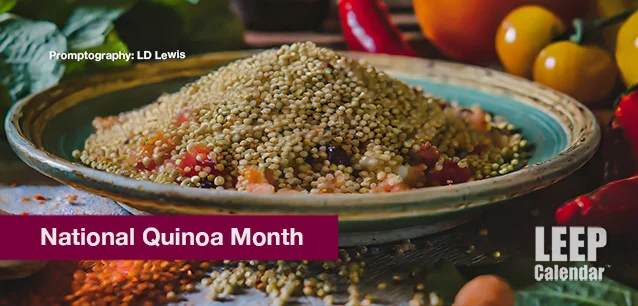 AD
AD
Today is: October 31
Scroll to explore events active on this date.
Additional Events on LEEP
LEEP INK FEATURES

August? Absolutely!
In August, we live through the Dog Days of Summer. It's hot and often humid, and those who can leave for better climates do. Down south, winter is in full force. August is also known as "the ...

In The Heat of July: July 2025 Events
Is it hot enough (or cold enough if you're below the equator) for you yet? There is actually a day for that! Like every month, I pick a diverse collection of events you may or may not know about. This ...

May Blooms: Events in May 2025
Along with October, May is one of the most densely packed months of the year. It's before the summer humidity and the last whole month of the school year. The weather is warming in t...
About Quinoa Month
Retail , United States
Ends: Mar 31, 2024
DESCRIPTION:
March is Quinoa Month.
Quinoa, often hailed as a "superfood" for its exceptional nutritional profile, has roots that trace back thousands of years to the Andean region of South America. Originating in areas surrounding Bolivia, Peru, and Colombia, quinoa has been a staple food for the indigenous peoples of the Andes for over 5,000 years. The Incas, who cultivated quinoa extensively, revered it as the "mother of all grains" and held it sacred for its life-sustaining properties.
The history of quinoa includes reverence and resilience. During the Spanish conquest in the 16th century, colonizers suppressed quinoa cultivation to introduce European crops. However, it continued to grow in isolated rural areas of the Andes, allowing it to survive and maintain its genetic diversity.
In recent decades, quinoa's popularity has surged globally, driven by its health benefits and suitability for gluten-free diets. It is rich in protein, contains all nine essential amino acids, and is a good source of fiber, vitamins, and minerals. Quinoa's low glycemic index and absence of gluten have made it a preferred choice for health-conscious consumers, including those with celiac disease or gluten sensitivities.
Culinarily, quinoa is known for its versatility and can be cooked like rice, used in salads, soups, and stews, or served as a side dish. Quinoa flour is used in baking, and quinoa flakes are a popular breakfast cereal. The grain's nutty flavor and fluffy, slightly crunchy texture have made it a favored ingredient in savory and sweet dishes.
Quinoa's rise to international fame has been challenging. The increasing demand has led to significant economic and cultural impacts in its regions of origin. While it has provided economic benefits to Andean farmers, there are concerns about sustainability and its effects on local communities and ecosystems.
Quinoa's story is one of endurance and rediscovery. From its ancient origins in the Andes to its status as a modern dietary staple, quinoa has journeyed through centuries, embodying a rich cultural history while meeting contemporary nutritional needs. Its global recognition speaks to a growing interest in traditional, nutrient-rich foods and the intersection of health, gastronomy, and cultural heritage.
VIDEOS
SUPPORTING DOCUMENTS
Currently, this event does not have supporting documents.
ADDITIONAL IMAGES
Currently, this event does not have supporting images.
Where would you like to go now?
 AD
AD


/footer-logo.svg)
